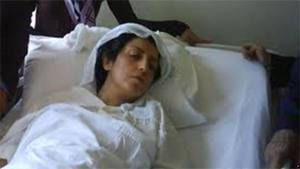
Narges Mohammadi
October 20, 2015 – The health of imprisoned activist Narges Mohammadi has deteriorated, and the prominent human rights defender is now reportedly chained to a hospital bed, denied proper medical treatment for a worsening neurological condition, and prevented from normal family visitation.
The International Campaign for Human Rights in Iran calls for the immediate release of Mohammadi, and the immediate provision of full medical care for the ailing activist.
“The imprisonment of this internationally renowned activist is a travesty of justice in itself,” said Hadi Ghaemi, executive director of the Campaign. “But the fact that she is chained to a bed and denied proper medical care is criminal. All interlocutors with Iran should explicitly demand Mohammadi’s immediate release.”
Narges Mohammadi was transferred to hospital on October 11, 2015, after suffering a seizure. She suffers from a neurological disorder that causes muscular paralysis.
According to her husband, Taghi Rahmani, who spoke with the Campaign, three agents keep watch over Mohammadi around the clock, and doctors believe that the stress caused by these circumstances are negatively affecting her neurological conditions.
“A female agent inside the room and two male agents outside keep 24-hour watch. Doctors have asked the agents to lessen the security state of the room, so that they can continue their treatment more easily. Narges’s illness is exacerbated by a stressful environment. They don’t allow anyone but the medical staff to visit with Narges. The only exception is on Sundays, the weekly prisoner visitation day, when they allow Narges’s sister to visit with her for ten minutes. Narges is not in prison. She is in a hospital. She needs one of her relatives to be by her bedside,” said Rahmani.
“Narges had a nervous attack [seizure] on October 7. The [prison] officials took her to Imam Khomeini Hospital, but she was returned to prison two days later. As her situation deteriorated, she was transferred back to another hospital under the care of her own neurologists on October 11,” the activist’s husband added.
Narges Mohammadi is receiving particularly harsh treatment by the prison authorities, as is routine in the case of political prisoners in Iran. Political prisoners are typically denied access to proper medical care, and suffer other punitive treatment such as denial of furlough, which is normally granted to other inmates for medical reasons or religious holidays, and family visitation.
In a July 2015 letter from prison Narges Mohammadi wrote about the authorities’ refusal to allow her to visit with her children. “The entire time I was inside [the Intelligence Ministry’s Ward] 209, they neither allowed me to hear their voices, nor did they allow me to see them. The bitterness and the sting of this ‘deprivation,’ which barred me from seeing those I hold dear, was no different than dying a slow death. I keep remembering my interrogator’s words, ‘You will pay with even more deprivations,’” wrote Mohammadi.
“Narges has also not been allowed telephone calls to her children for the past three months. Ever since the children came to stay with me [in France] three months ago, prison officials have not allowed Narges to contact her children, saying that this is because I am a fugitive suspect. It is every prisoner’s right to have phone calls to her family members. I’m sure if she can hear her children’s voices it would have an impact on her recovery,” Rahmani told the Campaign.
Narges Mohammadi, winner of the 2011 Per Anger prize for her fight for human rights and women’s freedom, was first arrested in 2009 and sentenced to 11 years in prison in October 2011 on charges of “assembly and collusion against national security,” “membership in the Defenders of Human Rights Center,” and “propaganda against state.”
The Appeals Court reduced her sentence to six years in prison and in 2013 she was released from Zanjan prison on 600 million toman (approximately $200,000) bail for medical reasons. Her arrest in May 2015, ostensibly on these older charges, was more accurately related to Mohammadi’s March 2014 visit with EU foreign policy chief Catherine Ashton at the Austrian embassy in Tehran, as well as her continued peaceful activism.
Since earlier this month, Mohammadi has been scheduled to appear before Branch 15 of Tehran Revolutionary Court to face new charges of “collusion,” “assembly against national security,” and “membership in Step by Step to Stop Death Penalty.” Three previous court dates for her trial, on May 3, July 6, and October 7 of 2015, were all postponed.
Follow the Campaign on Facebook and Twitter
For the latest human rights developments in Iran visit the Campaign’s website
For interviews, contact:
Hadi Ghaemi at +1-917-669-5996, hadighaemi@iranhumanrights.org
